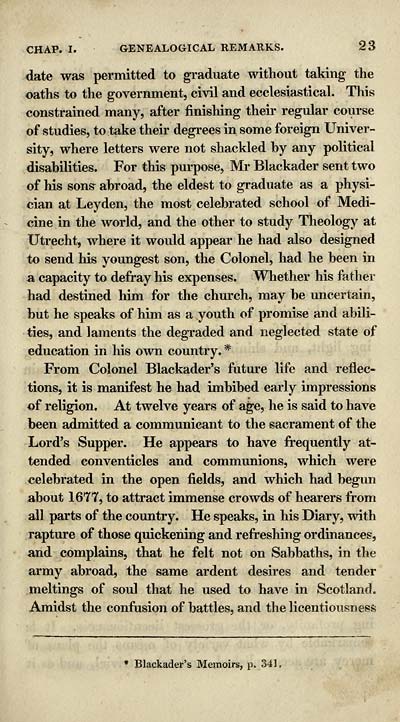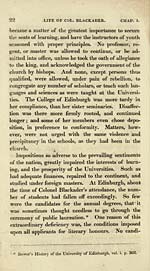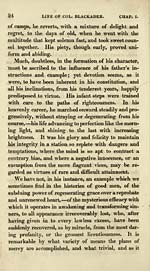Life and diary of Lieut. Col. J. Blackader
(27) Page 23
Download files
Complete book:
Individual page:
Thumbnail gallery: Grid view | List view

CHAP. I. GENEALOGICAL REMARKS. 23
date was permitted to graduate without taking the
oaths to the government, civil and ecclesiastical. This
constrained many, after finishing their regular course
of studies, to take their degrees in some foreign Univer-
sity, where letters were not shackled by any political
disabilities. For this purpose, Mr Blackader sent two
of his sons abroad, the eldest to graduate as a physi-
cian at Leyden, the most celebrated school of Medi-
cine in the world, and the other to study Theology at
Utrecht, where it would appear he had also designed
to send his youngest son, the Colonel, had he been in
a capacity to defray his expenses. Whether his father
had destined him for the church, may be uncertain,
but he speaks of him as a youth of promise and abili-
ties, and laments the degraded and neglected state of
education in his own country. *
From Colonel Blackader's future life and reflec-
tions, it is manifest he had imbibed early impressions
of religion. At twelve years of age, he is said to have
been admitted a communicant to the sacrament of the
Lord's Supper. He appears to have frequently at-
tended conventicles and communions, which were
celebrated in the open fields, and which had begun
about 1677, to attract immense crowds of hearers from
all parts of the country. He speaks, in his Diary, with
rapture of those quickening and refreshing ordinances,
and complains, that he felt not on Sabbaths, in the
army abroad, the same ardent desires and tender
meltings of soul that he used to have in Scotland.
Amidst the confusion of battles, and the licentiousness
* Blackader's Memoirs, p. 341,
date was permitted to graduate without taking the
oaths to the government, civil and ecclesiastical. This
constrained many, after finishing their regular course
of studies, to take their degrees in some foreign Univer-
sity, where letters were not shackled by any political
disabilities. For this purpose, Mr Blackader sent two
of his sons abroad, the eldest to graduate as a physi-
cian at Leyden, the most celebrated school of Medi-
cine in the world, and the other to study Theology at
Utrecht, where it would appear he had also designed
to send his youngest son, the Colonel, had he been in
a capacity to defray his expenses. Whether his father
had destined him for the church, may be uncertain,
but he speaks of him as a youth of promise and abili-
ties, and laments the degraded and neglected state of
education in his own country. *
From Colonel Blackader's future life and reflec-
tions, it is manifest he had imbibed early impressions
of religion. At twelve years of age, he is said to have
been admitted a communicant to the sacrament of the
Lord's Supper. He appears to have frequently at-
tended conventicles and communions, which were
celebrated in the open fields, and which had begun
about 1677, to attract immense crowds of hearers from
all parts of the country. He speaks, in his Diary, with
rapture of those quickening and refreshing ordinances,
and complains, that he felt not on Sabbaths, in the
army abroad, the same ardent desires and tender
meltings of soul that he used to have in Scotland.
Amidst the confusion of battles, and the licentiousness
* Blackader's Memoirs, p. 341,
Set display mode to:
![]() Universal Viewer |
Universal Viewer | ![]() Mirador |
Large image | Transcription
Mirador |
Large image | Transcription
Images and transcriptions on this page, including medium image downloads, may be used under the Creative Commons Attribution 4.0 International Licence unless otherwise stated. ![]()
| Histories of Scottish families > Life and diary of Lieut. Col. J. Blackader > (27) Page 23 |
|---|
| Permanent URL | https://digital.nls.uk/94933178 |
|---|
| Description | A selection of almost 400 printed items relating to the history of Scottish families, mostly dating from the 19th and early 20th centuries. Includes memoirs, genealogies and clan histories, with a few produced by emigrant families. The earliest family history goes back to AD 916. |
|---|

